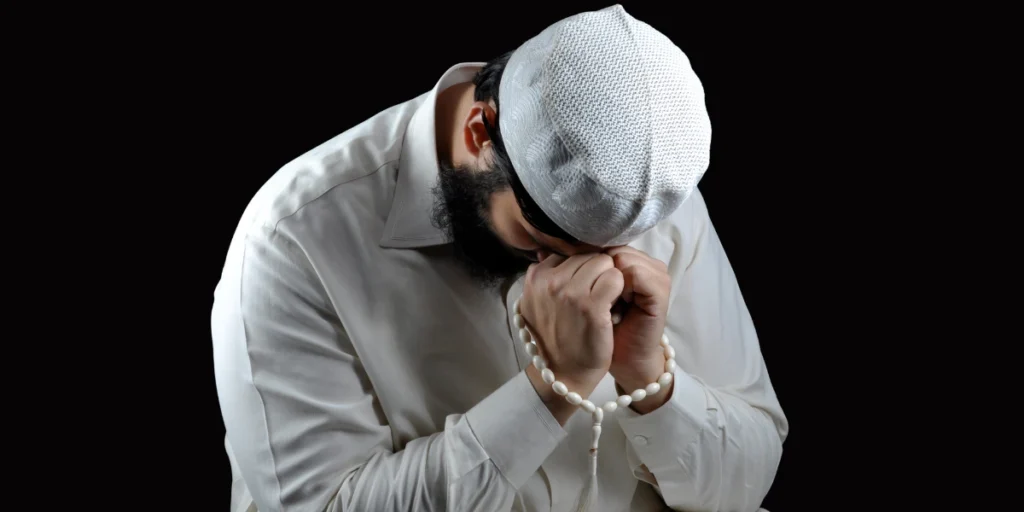Prayer for Mental Health: Islamic and Medical Healing for Anxiety, Depression, Stress, Trauma & Suicidal Thoughts
Introduction
Every day, millions silently battle anxiety, depression, stress, and trauma — wounds unseen by the world. For some, emotional pain grows so heavy it breeds suicidal thoughts, a despair that feels unshakable.
As a doctor, I’ve met patients whose lab tests were perfect but whose hearts were restless. They came seeking medicine — and found that true healing begins when medicine meets faith.
In Islam, prayer for mental health is both spiritual devotion and psychological therapy. It slows the racing mind, regulates breathing, and reminds the soul that it is never alone.
“Verily, in the remembrance of Allah do hearts find rest.”
— Surah Ar-Ra’d (13:28)
Modern neuroscience supports this. MRI studies show that prayer and dhikr decrease activity in the amygdala (the fear center) and boost serotonin, helping to calm anxiety and lift mood.
1.Understanding the Connection Between Prayer and Mental Health
Prayer for mental health works on three levels:
- Spiritual: It reconnects the believer with purpose, surrender, and hope.
- Psychological: It offers mindfulness — a focus that grounds thoughts in the present moment.
- Physiological: It reduces cortisol, balances the parasympathetic nervous system, and improves sleep.
Sujood (prostration) itself enhances blood flow to the brain, releasing endorphins that promote a sense of peace.
2. Prayer for Anxiety: Calming the Racing Mind
Islamic Perspective
Anxiety in Islam is called hamm or ghamm — the worry of what’s to come or sorrow for what has passed.
The Prophet ﷺ often sought refuge from anxiety, teaching this dua:
“Allahumma inni a’udhu bika minal-hammi wal-huzn…”
O Allah, I seek refuge in You from anxiety and sorrow. — (Bukhari)
When anxiety strikes, the brain’s sympathetic system goes into overdrive — heart rate rises, breathing shortens, muscles tense.
Prayer slows that down. Deep rhythmic recitation and breathing during salah activate the vagus nerve, shifting the body into relaxation mode.
Healing Plan
- Perform two rak’ahs of prayer for mental health when anxiety rises.
- Practice controlled breathing with dhikr (“SubhanAllah, Alhamdulillah, Allahu Akbar”).
- Reduce caffeine and maintain sleep hygiene.
3.Prayer for Depression: Finding Light in the Darkness
Islamic Perspective
Even prophets felt moments of deep sadness.
Prophet Yaqub (AS) cried until he lost his sight after losing Yusuf (AS).
Prophet Muhammad ﷺ went through ‘Aam al-Huzn — “The Year of Sorrow.”
Islam never shames depression; it calls the heart gently back to Sabr (patience) and Tawakkul (trust).
Dua for Depression
“La ilaha illa Anta, Subhanaka inni kuntu minaz-zalimeen.”
— Dua of Prophet Yunus (AS) in distress (Qur’an 21:87).
Medical Insight
Prayer boosts dopamine and serotonin, neurotransmitters often low in depression.
A Harvard study found that daily prayer reduces depressive symptoms by up to 40% in those with mild-to-moderate depression.
Practical Steps
- Recite Surah Ad-Duha when feeling hopeless — it was revealed to uplift the Prophet ﷺ.
- Combine therapy + prayer for mental health; both heal different dimensions of the soul.
- Engage in community — isolation worsens depressive cycles.
4.Prayer for Stress: Releasing the Burden
Islamic View
The Prophet ﷺ taught that five daily prayers act as washing away stress, just as wudu cleanses physical impurities.
“Between each prayer, Allah erases the sins of those who pray sincerely.” — (Muslim)
Medical Explanation
Stress triggers cortisol and adrenaline surges, which cause fatigue and inflammation.
Praying regularly, especially Fajr and Isha, stabilizes the circadian rhythm and reduces these stress hormones.
Quick Relief Tip
- Perform Sujood shukr (prostration of gratitude) whenever overwhelmed.
- Say “Hasbiyallahu la ilaha illa Huwa” — “Allah is sufficient for me.”
5.Healing from Trauma and Emotional Pain
Islamic Guidance
Trauma reshapes memory and emotion, but Islam offers Tadabbur — reflection and gradual healing through connection to Allah.
Prophet Ayyub (AS), who endured unimaginable trials, made this heartfelt prayer:
“Indeed, adversity has touched me, and You are the Most Merciful of the merciful.” — (Qur’an 21:83)
Medical Insight
Prayer helps trauma survivors re-establish emotional safety.
Clinical psychology recognizes faith as a resilience factor that speeds recovery from PTSD and emotional pain.
Steps for Healing
- Journal after prayer to externalize pain.
- Use gentle physical activity (walking after Salah).
- Seek trauma-focused therapy alongside dua and dhikr.
6.Suicidal Thoughts: Finding Hope Through Faith and Healing
Islamic Perspective and Compassion
In Islam, life is sacred — a trust (amanah) from Allah ﷻ. While suicide is forbidden, those struggling with suicidal thoughts are not condemned — they are cared for. The Prophet ﷺ said,
“Allah is more merciful to His servants than a mother to her child.” (Sahih Bukhari)
Feeling despair doesn’t mean you’ve lost faith — it means you’re deeply in pain and need compassion, not judgment. These thoughts are symptoms of suffering, not signs of weakness or sin.
Healing Plan: Faith + Professional Support
- Seek Immediate Help

If you ever feel unsafe with your thoughts, please reach out for urgent medical or psychological care. Islam encourages seeking treatment — the Prophet ﷺ said, “Seek treatment, for Allah has not created a disease except that He also created its cure.” - Spiritual Practices for Calm
- Recite Ayat al-Kursi (2:255) for protection.
- Read Surah Al-Inshirah (94:1–8) — “Did We not expand your chest?” — a reminder that ease follows hardship.
- Make dua, even if it’s just, “Ya Allah, help me through this pain.”
- Build a Support Circle
Talk to a trusted imam, therapist, counselor, or loved one who understands both faith and mental health. You are not meant to face this alone. - Reconnect with Hope
Healing takes time. Remember — Allah never burdens a soul beyond what it can bear (Qur’an 2:286). Even in despair, you are still under Allah’s mercy and seen by Him.
7.Scientific Evidence: How Prayer for Mental Health Works
- Reduces amygdala hyperactivity (anxiety trigger)
- Increases frontal lobe activity (focus, calm)
- Boosts oxytocin (bonding hormone, emotional safety)
- Improves sleep and heart rate variability
- Promotes resilience against depression and trauma
(References: American Psychological Association, Journal of Behavioral Medicine, WHO Mental Health Reports)
8.Daily Routine for Emotional & Spiritual Balance
| Time | Practice | Purpose |
| Fajr | Pray early, recite Surah Yasin | Cortisol balance & morning calm |
| After Dhuhr | Dhikr: “La hawla wala quwwata illa billah” | Reduces tension mid-day |
| Asr | Reflective walk + gratitude journaling | Clears stress hormones |
| Maghrib | Dua for mental health & family peace | Emotional grounding |
| Isha | Surah Mulk before sleep | Improves sleep & heart rate |
9.Combining Faith and Therapy
Islam encourages seeking both prayer and professional help:
“Tie your camel, then trust in Allah.” — (Tirmidhi)
That means taking medication if needed, attending therapy, and performing prayer for mental health consistently.
For verified guidance, visit your trusted Muslim therapist or psychiatrist — faith and science are allies, not rivals.
Conclusion
Mental pain does not mean weak faith — it means being human.
Through prayer for mental health, Allah opens a doorway of peace between the chaos of the mind and the stillness of the soul.
If you feel lost, remember: your heart still beats — proof that Allah still calls you to live, heal, and return to Him.
“And whoever puts his trust in Allah — He is sufficient for him.” — (Qur’an 65:3)
FAQs
Q1. Can prayer alone cure depression or anxiety?
Prayer for mental health brings comfort and biochemical balance, but medical care may also be needed for full recovery.
Q2. How often should I pray for mental peace?
Beyond the five daily prayers, perform extra nafl or tahajjud — consistency matters more than duration.
Q3. Which Surahs help with depression and anxiety?
Surah Ad-Duha, Surah Inshirah, and Ayat al-Kursi are known for spiritual uplift.
Q4. Can I take antidepressants while relying on dua?
Yes — Islam encourages using all lawful means of healing. Dua complements, not replaces, treatment.
Q5. Is feeling suicidal a sign of weak faith?
No. It’s a sign of deep pain. Seek immediate professional and spiritual help.




